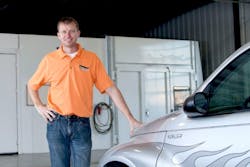Probst Auto Body sits along Hwy 33 in the Village of Dieterich, a 600-person farming community in southeastern Illinois.
By every measure, Dietrich is a small town, not exactly ideal for a business that relies heavily on a high quantity of quality customers.
But Mark Probst, who opened the shop in 2000, doesn’t see it that way—or at least, he doesn’t think it’s a problem.
“Well, I wouldn’t say I have a small market; it’s just more spread out,” he says. “Ten miles down the highway one way is a town with about 10,000 people. Ten miles the other way is a town that has 15,000 people. And another 10 miles from those are other towns, and in between are farms. We have people; they’re just not right by us.
“What I’ve really found is that people will drive that extra bit to you if they know they’ll get treated well, if they know they’re getting something extra or a shop that really cares about what they’re doing.”
Probst Auto Body
Location:
Dieterich, Ill.
Shop:
6,400 square feet
Staff:
6 full-time, 2 part-time
Annual revenue:
$1.1 million
Monthly car count:
60
Cycle time:
4.5 days
The size of your town doesn’t matter as much, Probst says, as making sure customers realize that you are the shop offering that better experience.
And that’s what he has spent every day of the last 12 years doing.
Since 2000, Probst, 36, has grown his business from a one-man, 2,400-square-foot shop into a $1.1 million operation that works on roughly 60 cars a month.
It’s about marketing, customer service, being part of the community, Probst says. It’s about focusing on all the small things that add up to something bigger.
First Things First
It was Probst’s older brother, a mechanic, who first got him interested in cars while in high school in another small town near Dieterich.
Probst earned an associate’s degree in collision repair and worked nine years, starting as a teenager, for a body shop at a large dealership in Effingham, Ill.
“Then I just got to the point where I really felt I needed to do something more, something on my own,” he says. “I wanted to start my own shop.”
There was an empty space available in Dieterich—basically, just a simple 60 feet by 40 feet room that he could get on “a very cheap lease.”
“The only thing I really knew to do was to try and offer the best work possible and treat people as well as I could,” he says. “I thought that [should come] first, and then it’d grow from there.”
And it did. After starting from scratch (he had no existing customers and no customers he brought with him from his other job), Probst hit $300,000 in annual sales by 2006. He was able to hire more staff and build a new facility: a 6,400-square-foot shop with all the latest in equipment.
He opened up the new shop in a better location, along the relatively busy Hwy 33, in 2007, and expected the business to grow naturally through his team’s hard work and commitment to quality repairs.
It didn’t. By the start of 2009, the shop’s sales were only up slightly to roughly $37,000 per month.
All the Small Things
Probst knew his shop was capable of much more than it had produced.
“My team is great,” he says. “We have, and had, really good people who are very good at what they do. We did quality work and everyone was really friendly and customers liked us. It was just one of those things where something was missing.”
This was when Probst began working with a consultant, someone to give him an objective look at his business. He also joined a peer network to solicit advice from other shop owners.
His first major revelation: All the hard work he poured into his business wasn’t helping anyone.
Probst, who started his career as a painter, was still writing estimates at the time and heavily involved in day-to-day operations.
Being stuck behind the counter all day didn’t allow him to work on anything that would actually improve his business.
“It’s hard to trust that people can do a better job than you can,” he says. “But I think I started to realize that if you’re doing everything, you can’t be good at everything. You have to trust people to do their job.”
At the urging of his consultant, Probst hired an estimator, and that’s when everything changed.
“I was freed up to look at the business as a whole and plan for its future,” Probst says. “I was able to network more and work on these bigger ideas, and it all started to pay off.”
Within a year, the shop’s monthly sales rose to just under $50,000. Today, roughly three years later, monthly sales are at $90,000.
He did it all focusing mainly on two things: customer service and marketing.
Customer Service
Probst knew his shop did a great job handling customers—that is, when the customers were within the doors of the shop.
“We weren’t doing any follow-up, we weren’t getting ourselves out there in front of them,” he says. “We were simply letting them come to us.”
Probst started doing follow-up calls to every customer one week after their car was returned. His staff started doing customer surveys to get a better read on how people perceived them. They started putting hand-written thank-you notes in every completed vehicle. And they started a new referral program that rewarded loyal customers who recommended his shop.
“It’s all these little things that, while they may not seem important on their own, add up a lot to customers,” he says. “By doing all these little things, it puts together a bigger picture of who our shop is.”
The reaction from customers was extremely positive, Probst says, and with all the praise the shop received, he started using the feedback as testimonials in his marketing and on his website.
“We were still treating people well, like we always had, but now we’re giving them reasons to remember us more,” he says.
Marketing
Like Probst says, his market isn’t necessarily all that small; it’s just spread out. So, he needed new ways to reach people and make his shop seem like customers’ local, family business, even if it wasn’t in their town.
First, he started more public relations initiatives. Probst helps various area organizations put on fundraising car washes at his facility, supplying all the equipment and space. He also began participating in Wheels to Prosper, a car giveaway project. The shop hosts an annual open house (more of a customer appreciation day, Probst says), sponsors floats in local parades and helps out with as many local events as it can. Probst is also active in the chamber of commerce and helped found the Dietrich Business Association.
“It’s all about getting your name out there,” he says. “These are things that help out our community, and that’s a big part of it, but they also help people associate our name and our faces with all these great events.”
Speaking of putting a face to a name, Probst also started an outside sales initiative. Either Probst or one of his front-office employees goes out to roughly 30 area businesses each week, delivering care packages and networking.
“We do it one day a week,” he says, “and the goal is to talk with these other businesses and these people in the surrounding towns and let them know who we are. We’re not there to sell them anything; we’re just trying to get out and meet them and hopefully have our name stick in their heads.”
Probst says that the outside sales effort has led to a great increase in referrals and new customers.
The same can be said for his loaner cars—free to customers and dressed up with the company logo across the sides—as well as the free Probst Auto Body T-shirts he gives away to customers whose repair bills exceeded $1,000.
“It’s basically free advertising, and the hope is that other people will see the cars or see the shirts and ask the person about them and about us,” Probst says.
Small is the New Big
Probst is quick to deflect any credit for his business’s success to anyone and everyone who has helped him along the way. After all, he says, his brother got him in the industry, his wife and family helped support him in building a business, and it’s the great people around him in the shop that have made everything so successful.
“I’m really lucky to have surrounded myself with the people I have,” he says. “I certainly didn’t come up with all of this on my own.
“And that’s really the key—at least, it was for me—in really improving my business: Realizing that I didn’t know everything and that I needed to trust in the people around me, whether it was my staff, my consultant or other shop owners I network with.”
Probst expects 2013 to be the shop’s best year to date and sees no reason that the growth trends won’t continue for some time.
“We’re on this fairly big highway that connects all our towns,” he says. “There’s a lot of opportunity. It’s just about making the most of it.”
About the Author

Bryce Evans
Bryce Evans is the former vice president of content at 10 Missions Media, overseeing an award-winning team that produces FenderBender, Ratchet+Wrench and NOLN.
